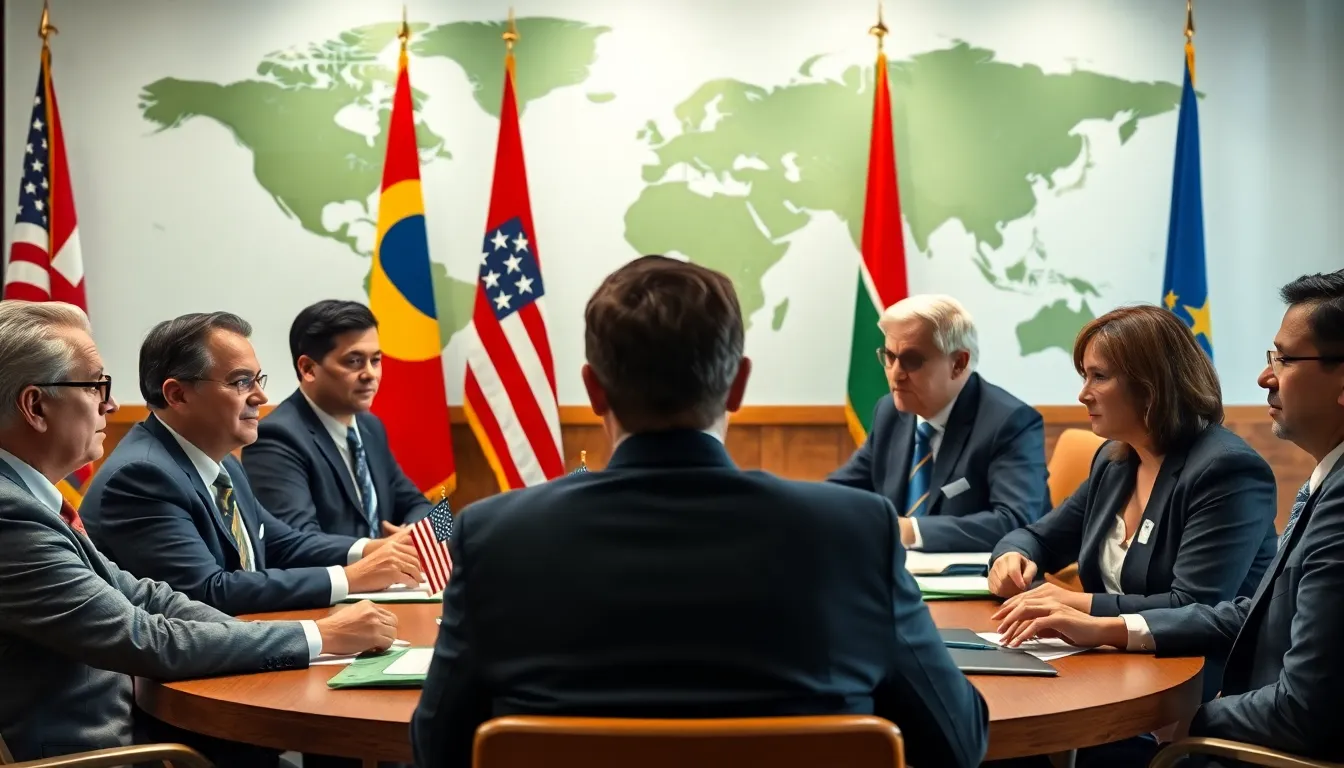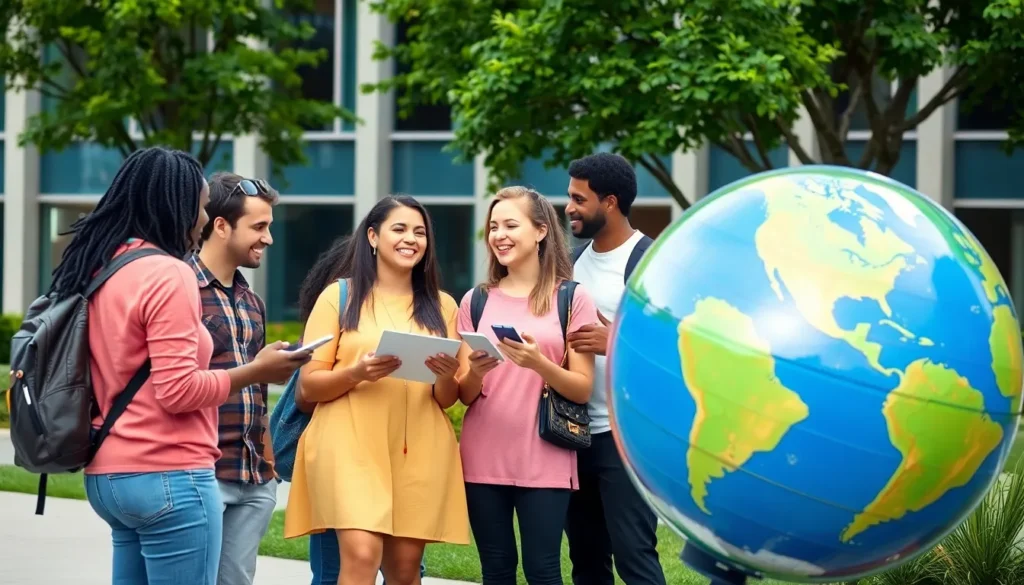In an increasingly interconnected world, diplomatic conversations play a crucial role in shaping international relations. These discussions, often held behind closed doors, are where nations negotiate, resolve conflicts, and build alliances. The art of diplomacy requires not just skilled negotiators but also an understanding of cultural nuances and strategic interests.
As global challenges become more complex, the importance of effective communication among diplomats cannot be overstated. From trade agreements to peace treaties, these conversations influence everything from economic stability to global security. By examining the dynamics of diplomatic conversations, one can uncover the intricate processes that underpin international cooperation and the delicate balance of power among nations.
Table of Contents
ToggleOverview of Diplomatic Conversations
Diplomatic conversations play a crucial role in shaping international relations. These discussions foster negotiation and collaboration, addressing complex global challenges.
Definition and Importance
Diplomatic conversations refer to formal and informal exchanges between representatives of different nations. These interactions promote understanding and cooperation, allowing countries to navigate disputes and align interests. Their importance lies in three key areas:
- Negotiation: Negotiations facilitate agreements on contentious issues, from trade to security.
- Conflict Resolution: Conflict resolution processes depend on open dialogue to manage tensions and prevent escalation.
- Alliance-Building: Alliance-building efforts rely on ongoing communication to strengthen partnerships and ensure mutual benefits.
Historical Context
Historically, diplomatic conversations date back to ancient civilizations, where emissaries conveyed messages between leaders. Key milestones include:
- Treaty of Westphalia (1648): Established principles of sovereign states and marked a shift toward formal diplomacy.
- Congress of Vienna (1815): Introduced multilateral diplomacy, aiming to achieve lasting peace in Europe.
- United Nations (1945): Created a platform for global dialogue, facilitating discussions among member states on various issues.
These events highlight how diplomatic conversations have evolved, adapting to the changing dynamics of international relations while maintaining their fundamental purpose of fostering cooperation and peace.
Key Elements of Effective Diplomatic Conversations

Diplomatic conversations hinge on several key elements that ensure meaningful exchanges between nations. Understanding these elements enhances the potential for successful outcomes in international relations.
Active Listening
Active listening stands as a fundamental component of diplomatic conversations. It requires diplomats to focus intently on the speaker’s message, demonstrating openness and respect. This technique fosters understanding and encourages participants to express their perspectives fully. Techniques such as paraphrasing and asking clarifying questions allow for deeper insights into the other party’s intentions, fostering mutual respect. Engaging in active listening can de-escalate tensions and create an atmosphere conducive to collaboration.
Cultural Sensitivity
Cultural sensitivity significantly influences diplomatic conversations. Understanding diverse cultural norms and values prevents misunderstandings and miscommunications. Diplomats should research the customs and traditions of their counterparts, ensuring they approach conversations with awareness and respect. This knowledge enhances rapport and demonstrates commitment to partnership, allowing for smoother negotiations. Adapting communication styles to fit cultural contexts promotes inclusivity and encourages open dialogue, crucial for building lasting alliances.
Challenges in Diplomatic Conversations
Diplomatic conversations face numerous challenges that can hinder effective communication and successful outcomes. Key issues include language barriers and misunderstandings, both of which play significant roles in shaping the dynamics of international discussions.
Language Barriers
Language barriers significantly impact diplomatic conversations. When representatives do not share a common language, misinterpretations can occur, affecting the negotiation process. The use of interpreters can mitigate these issues, though they can introduce additional complexities. Misinterpretations during translation may convey unintended meanings or emotions. Even with proficient language skills, nuances specific to cultural contexts can lead to confusion. Each language possesses its own idioms and expressions, complicating interpretation. As a result, diplomats often rely on shared languages or professional translators to facilitate clearer communication.
Misunderstandings
Misunderstandings frequently arise in diplomatic conversations due to cultural differences and varied communication styles. Cultural norms influence the way individuals express their ideas, leading to potential misinterpretations. Direct communication may be favored in some cultures, while others might opt for more indirect methods, causing confusion in exchange. Furthermore, emotional responses can differ based on cultural backgrounds; what one party perceives as assertiveness might be viewed as aggression by another. These misunderstandings can derail discussions and escalate tensions, making it essential for diplomats to develop cultural competence. Active listening, asking clarifying questions, and maintaining patience can help minimize misunderstandings, fostering a more constructive dialogue.
Prominent Examples of Diplomatic Conversations
Diplomatic conversations have historically shaped global events, serving as pivotal moments in international relations. Two significant case studies exemplify the effectiveness and challenges of these discussions.
Case Study: The Camp David Accords
The Camp David Accords marked a watershed moment in Middle Eastern diplomacy. In 1978, U.S. President Jimmy Carter facilitated negotiations between Israeli Prime Minister Menachem Begin and Egyptian President Anwar Sadat at Camp David. The dialogues lasted 13 days and produced a framework for peace, culminating in the Egypt-Israel Peace Treaty of 1979. The Accords aimed to resolve territorial disputes and promote mutual recognition, representing a significant shift in relations between Israel and Arab nations. Active listening and compromise characterized these conversations, with each leader committing to a vision for a peaceful coexistence, demonstrating the potential of diplomatic dialogue to achieve lasting agreements.
Case Study: The Iran Nuclear Deal
The Iran Nuclear Deal, officially known as the Joint Comprehensive Plan of Action (JCPOA), illustrates the complexities of modern diplomacy. Negotiations began in 2013, involving Iran and six world powers: the U.S., U.K., France, Russia, China, and Germany. The primary goal was to limit Iran’s nuclear program to prevent the development of nuclear weapons in exchange for lifting economic sanctions. The discussions spanned two years, requiring skilled negotiation and a deep understanding of each party’s strategic interests. Despite its eventual success in 2015, the deal faced challenges such as differing interpretations of compliance and ongoing geopolitical tensions. The JCPOA serves as a testament to the intricate, often precarious nature of diplomatic conversations, emphasizing the necessity for continuous dialogue to maintain international agreements.
Diplomatic conversations remain a cornerstone of global interaction. They not only facilitate essential negotiations but also help build alliances and resolve conflicts. As the world faces increasingly complex challenges, the need for skilled diplomats who can navigate cultural nuances and communicate effectively has never been more critical.
The evolution of these conversations reflects the changing dynamics of international relations, showcasing their enduring importance in fostering peace and cooperation. By prioritizing active listening and cultural sensitivity, diplomats can enhance their effectiveness and contribute to a more stable world. Ultimately, the art of diplomatic conversation will continue to shape the future of international relations, ensuring that dialogue remains at the forefront of global diplomacy.






